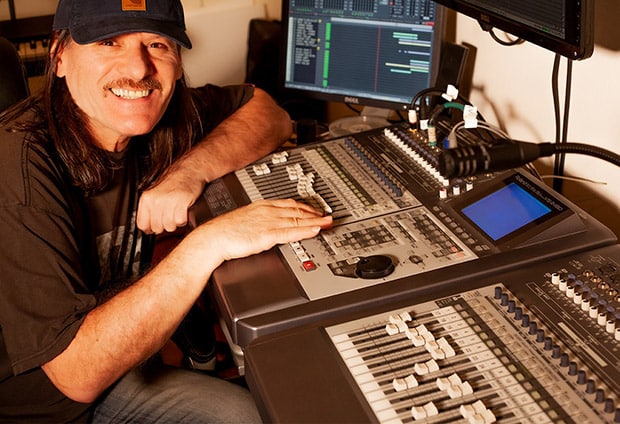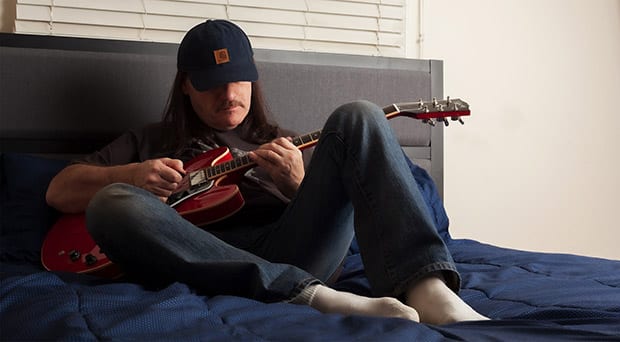
Fourth in a series about music in the time of Covid-19.
For a moment there was complete silence, then a few keyboard strokes and Wesley Orsolic’s familiar Slavic accent echoes from my speakers. The screen fills with his image, behind him to his right sits a rack with two keyboards and a synthesizer stacked horizontally equidistant from each other. To his left is a mixing board with a monitor hovering above it and another monitor hanging from the wall directly behind him.
Orsolic grew up in Zagreb, Croatia, during a time when the country was one of six republics of Yugoslavia. He left in search of a record contract in the United States a few years prior to the Croatian War of Independence (March 1991 – November 1995).
Can you tell me a little about your music background?
“I started with music very, very young. I was about 4 years old when my dad bought a guitar and he played a few chords here and there. I’d watch his hands.
When I was about 6, I could actually grab the guitar neck. My dad comes home and I’m strumming these chords. He was very surprised. But …” The cadence of Orsolic’s voice slows, accentuating each word. “I loved it so much. My parents were very supportive of my career.
“I would put my head on a guitar like this …” Orsolic cocked his head to the left resting it in the palm of his hand and closed his eyes, his voice softened. “And strum the strings and I was mesmerized and then I would fall asleep on the guitar and I couldn’t believe that sound was coming out of that box.”
Has your career always involved music?
“I did a lot of studying and listening to music. I became pretty efficient with the guitar. I was good. Even being maybe 11 or 12 years old, I was building a crowd around myself. Everywhere I went with the guitar, I had like 30 kids around me and I thought, ‘This is just normal.’ It was just my friends.”
Orsolic’s voice starts to get a bit louder, his eyes widen and eyebrows raise as if still in shock.
“These older musicians would call me, ‘Do you want to play in a band?’ I found myself at 13 years old and these guys were maybe five, six years older, they got me in a band and I was smoking their asses. I just played way better than they did.
“One day there was an article in the newspaper and they wrote, ‘This amazing kid guitar player prodigy…’ All the sudden the whole hell broke loose. I got calls from best musicians in the country.
“When I was 14, my first concert was about six to seven thousand people. It was on the Adriatic Coast. This band was like three or four older guys. The stage was on a huge boat and huge PA and I just looked, it was a sea of people, and I was like, ‘Dang, this is cool I just want to do this all of my life. This is so easy.’
“I ended up getting this call from this major lead singer in the country, he asked my dad, ‘Can I get him for the summer?’ I joined this band, (named Had). It ultimately made it really big. We played this underground rock. Had in Greek means the underground. We were smokin’ hot.”
Compared to other socialist states, Yugoslavia was more exposed to Western influences. The borders were open and citizens traveled freely maintaining easy access to Western popular culture. From its inception, the rock scene was socially accepted and quickly became well developed. Numerous magazines, radio and TV shows covered the rock culture and featured emerging bands and talent including Orsolic.

Wesley Orsolic self-portrait
How long have you been in Tahoe?
“I moved up here in 2000. I used to play up here quite a bit, maybe four to six weeks at a time two or three times a year. First time I came here, I was like, this is just heaven here. So, at that time I was thinking to myself if I ever get off the road, if I don’t want to travel anymore, I’d just move up here.”
What brought you to the U.S.?
“I could sound really good but I still didn’t understand theoretically what I was doing. Later on I played with some very experienced and skilled jazz musicians. They said, ‘You sound incredible, but you really don’t know what you’re playing,’ like I’m speaking to you, but I’m not understanding what I’m saying to you. I decided to go Berklee College of Music in Boston. I was there for about a year, I came back to Croatia, I send some of my songs to 15, 20 record companies, but it was Motown (Records) that wanted me. They were just excited about having some kind of deal once I had a meeting with them. Imagine me being a little bit spoiled, even this happened this easy for me.”
Orsolic turned them down.
“They offered a three-year contract. But they would keep the publishing rights. I make like minimum 15 percent as a producer a writer whatever and I was living off of royalties at that time. I could not accept that. So I turned them down. They didn’t have to pay anything (to musicians) most of them went through really hard times being exploited by record companies. You would think as a fan these people are doing fantastic and they were struggling.”
Are you still getting royalties from Croatia?
“Yeah, I always have something off that. I’m making money on the side.”
Orsolic doesn’t get as much from royalties as he did before the war.
“I think because of the break of a country a lot of that stuff was lost. The capital was in a different city with the hall of records and I think all that got mixed up. I also got some royalties off of some songs that I didn’t write.
What have you been doing with your time now that you’re not playing live?
“What I do I write music a lot and I love that, I like the creative process.
This situation we’re in with this lockdown is not a normal thing. You can’t compare it to anything. Even when drastic things like this happen, I always take a deep breath and try to understand what is going on and is there a possibility. I’m booked for whole summer but I don’t know if anything is going to happen.
Are you playing online with your band?
“I think it’s oversaturated. I’d rather use that time to create and then we come back, come out with a new album. This is a good time to take a deep breath. I also have new members in a band and we’re going to have rehearsals and incorporate new materials.
“Playing (gigs), it’s not good for your chops as much as when you really put your mind into practicing. So, you need to have a certain amount of time being alone and kind of analyze songs: What would work. Where’s music going nowadays. I really pay attention to that.”
When all of this is over, do you think a lot of musicians are going to have new material?
Many of them will. They’ll probably realize that life is so fragile. If you don’t learn from this, then your just not paying attention to anything, and that’s sad.”
Orsolic also is an accomplished photographer, “I’m so inspired that I lose myself,” he said.
“I completely forget about this corona thing. I was out in my world for about two or three hours. If you don’t have something like that and if you worry all the time and you watch this news and all these crushing numbers people dying, well that affects you and I’m just trying to stay away from that.
“If anything goes wrong with music, I have something to fall back on.”
-Michelle Gartner

